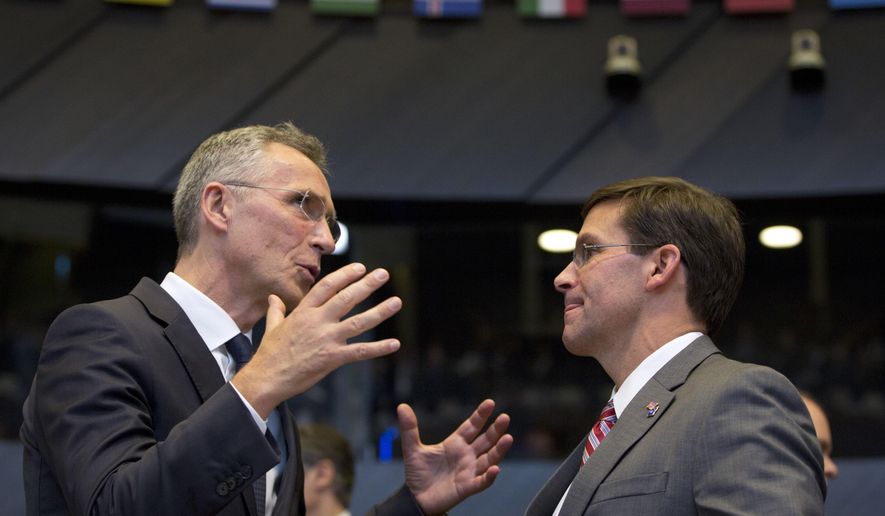BRUSSELS (AP) - NATO allies gave the U.S. no firm commitments that they will participate in a global effort to secure international waterways against threats from Iran, acting Defense Secretary Mark Esper said Thursday, wrapping up his first alliance meeting.
Esper said the U.S. will come back next month and provide reluctant allies more details on exactly how the Iranian threat has escalated in recent months, and how nations can work together to deter further aggression.
“At the end of the day what our ask is here, near term, is to publicly condemn Iran’s bad behavior,” Esper said as he prepared to leave Brussels. “And in the meantime, in order to avoid a military escalation, help us maintain the freedom of navigation in the Strait of Hormuz, in the Persian Gulf and wherever.”
Esper, who didn’t have high expectations for firm commitments coming in, got little of either, though he said that some allies privately expressed interest in hearing more.
Esper’s visit to NATO, just days after he took over at the Pentagon, came amid sharply increased tensions between the U.S. and the Islamic Republic. The Trump administration has blamed Iran for recent attacks on oil tankers in the Gulf of Oman, as well as bombings in Iraq. Iranian forces also shot down an American drone that it said had flown into its airspace, which the U.S. disputes.
Earlier this week, as he headed to NATO, Esper said his goal was to persuade allies that the confrontation with Iran is a global challenge requiring an international response, and that it is “not Iran versus the United States.”
Esper’s discussions with NATO counterparts were aimed at reinforcing the call to action delivered earlier this week by Secretary of State Mike Pompeo. U.S. leaders want to build a broad coalition, including Asian and European countries, to counter the Iranian military threat, and help monitor shipping in the Persian Gulf region, where oil tankers have been attacked.
NATO allies have expressed reluctance to get involved in any military effort to help secure the region or counter Iran. Europe wants more emphasis on minimizing the chances of war, especially after the events of last week, when President Donald Trump approved military retaliation for Iran’s strike against the drone, then withdrew the order at the last minute.
Esper said Thursday there is a range of options that allies could participate in, ranging from increased air surveillance and maritime escorts to the establishment of a “picket line” of ships to protect the waterways near the Gulf. Those ships would essentially set up a series of checkpoints in the Gulf region.
Asked about allies’ reaction to the U.S. request, NATO Secretary General Jens Stoltenberg said Thursday that there were no decisions made to take any action.
“Allies agreed that we are deeply concerned about what Iran has done and is doing in the region,” said Stoltenberg. “The dialogue between allies will continue, but the main message - the main focus - of all allies is to de-escalate, is to actually avoid a conflict, is to find ways to reduce tensions.
One European NATO diplomat said the alliance wants to stay away from the issues linked to Iran. Instead, the alliance wants to see more calm from the U.S. and Iran, and don’t want the matter to become a NATO issue, said the diplomat, who spoke on condition of anonymity to reveal private discussions.
Trump, who withdrew the United States last year from an international deal to limit Iran’s nuclear program and then reinstated harsh economic sanctions, says he wants to work out an even more restrictive deal with Tehran. Germany, France and Britain, as well as Russia and China, remain part of the Obama administration-backed nuclear deal that Trump abandoned last year. The 2015 agreement aimed at curbing Iran’s nuclear ambitions in exchange for relief from economic sanctions.
Iran, however, has denounced the latest U.S. sanctions as “idiotic” and an obstacle to talks. In response, Trump fired back that “any attack by Iran on anything American” would be answered with overwhelming military force that “in some areas” would mean “obliteration.”
The attacks and escalating tensions have raised worries of an impending conflict between the U.S. and Iran. But, in public and private meetings, Esper repeatedly pressed the Trump administration message that America does not want war.
“Most partners in the room acknowledged the challenges we face,” said Esper. “I think they appreciate that the United States is not seeking war with Iran that we want to get this off of a military track and onto a diplomacy track.”
—Associated Press writer Lorne Cook in Brussels contributed to this report.




Please read our comment policy before commenting.